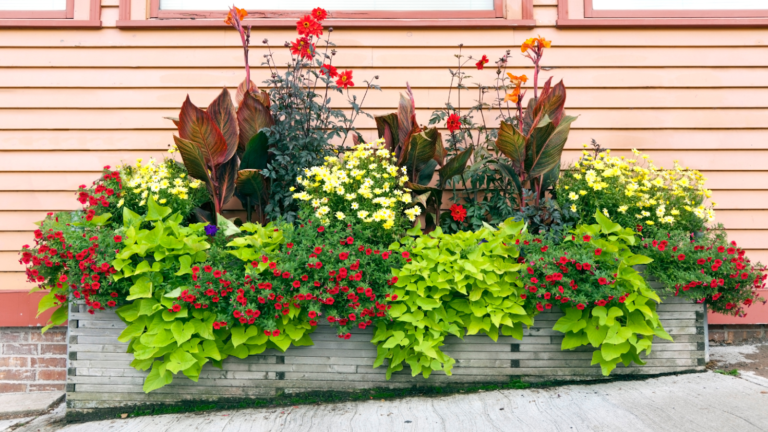How To Start A Gardening Business
How To Start A Gardening Business
Starting a gardening business can provide you with financial independence and a consistent source of income while also satisfying your entrepreneurial spirit.
You can achieve these objectives by laying the groundwork for your business with a few preliminary steps.
To determine whether gardening is the proper vocation, consider the following critical aspects of running a gardening business. Then, read this article to discover how to start a gardening business.
Why Should You Start A Gardening Business?
Starting your own gardening business is not only a rewarding challenge, but it also gives you the freedom to focus on the aspects of gardening that you love.
Whether essential maintenance work like trimming hedges and mowing lawns or specialized services like tree doctoring, planting, and watering.
Aside from the freedom that comes with running your own small business, working as a gardener has several other advantages:
- It provides consistent and reliable work (earnings are likely to be consistent from week to week)
- It allows you to develop good, long-term relationships with your customers,
- It allows for very flexible working hours, and, last but not least,
- It is a healthy, enjoyable job that requires minimal time in front of a computer and maximum time outside.
Over the next few years, demand for outsourced services such as professional gardeners will rise among middle-to-high-income households and older people, so you should have no trouble finding customers for your gardening business.
While putting your entire life on the line for your first business may seem daunting, planning carefully and putting in the necessary time and effort can be a tremendously rewarding experience!
Tips To Start A Gardening Business
1. Work As A Full-Time Business
Gardening can be turned into a full-time job with little or no experience, and there is plenty of demand for trustworthy, honest people.
With so many homeowners struggling to balance their hectic schedules, you'll be in high demand.
Furthermore, if you live in a region with changing seasons, you may want to hire workers to clean up after the leaves fall or to remove snow.
Furthermore, some clients may require year-round care for their greenhouse or office plants.
You can make a steady, long-term income by combining regular clients with one-time cleanups of run-down properties.
According to the Bureau of Labour Statistics, you can earn between $18 and $20 an hour. The bookkeeping is kept simple by having monthly maintenance schedules with clients.
Gardeners can access helpful online resources from the National Gardening Association and the American Horticultural Society.
2. Purchase Of Supplies And Equipment
You might already have the necessary equipment at home. A vehicle and gardening equipment are two necessities.
Depending on the job, you might also want to have carpentry tools on hand. These are useful for things like seedboxes in vegetable gardens, but they're also helpful if you're working on an overgrown green area or hard soil.
You may also need basic office supplies or a simple software program to keep track of your business's income and expenses and provide customer payment receipts.
3. Establish A Legal Entity
To determine the legal structure for the type of business you want to start, look up the rules in your state.
If you work alone, a sole proprietorship may be the best option. If you're working on a project with another person, you should consider forming a legal partnership. Consult an attorney to determine the best course of action for you.
Remember to check your city's, county's, and state's licensing requirements. A personal license stating that you are authorized to perform gardening or landscaping services may be required in addition to a business license.
4. Make A Business Strategy
Create a business strategy. Review some templates online if this is your first time writing one. A business plan can assist you in forecasting your cash flow, expenses, and revenue for the next three to six months.
Even if you don't need money to start your business, developing the habit of writing a business plan will prepare you for when you do need to apply for a loan.
5. Create A Financial Plan
As you get started, you may want to operate on a cash-only basis to gauge service demand.
You'll eventually want to accept other forms of payment, such as credit cards. This entails forming a partnership with a credit card processing service or signing a contract with a small business office software provider to gain access to these critical capabilities.
6. Promote Your Brand
It's time to promote your company. Begin by spreading the word among friends and neighbours.
Create social media pages and a Google My Business listing so people can find you when looking for a local garden expert.
Add exciting articles about gardening to your website and social media pages to generate interest and attention.
Consider launching an email marketing campaign as your company grows. This can help you grow your business and hire more people as you gain more clients.
7. Reconsider And Revise
It's time to reflect on how things are going now that you've been at the company for a few weeks.
Reevaluate and fine-tune your marketing strategy to find the sweet spot of regular work and consistent income.
Make any necessary changes to your business plan. If necessary, change course or build on what's already working.
Examine whether traditional marketing methods such as coupons can assist you in expanding your client base.
8. Job Scheduling
Make a plan for how you'll schedule your gardening tasks. Consult each client to determine their requirements and the best course of action. Here are some options for scheduling:
- A free consultation is when you go to the client's home and discuss their requirements.
- A “one-and-done” garden project in which you do basic landscaping, plant installation, or seed sowing.
- A weekly visit to the client's home for cleanup, pruning, and watering as part of an ongoing maintenance agreement.
As you spend more time with clients, you will better understand what they require. In response to client feedback, you can offer different-length appointment times and change your service listing.
9. Create A System For Keeping Track Of Everything
Set up a basic record-keeping system before accepting clients and taking payments. This is your garden or landscaping company's “back office.”
Here are the things you need to track, whether you use a simple software program or write it out by hand:
- Availability to accept positions,
- Reservations for clients,
- Payments received,
- The flow of funds, and
- Expenses
In summary, at the very least, you'll need a business calendar to track your time and a ledger system to track your money.
A small business software program may include a combined calendar function for scheduling and a spreadsheet function to track your finances.
10. Choosing The Right Employees
You could start as a sole trader and then expand to hire employees, or you could plan to hire a dedicated workforce from the start. Your company will thrive rather than flounder if you hire the right people.
A recruitment strategy is necessary for determining the roles you need to hire, the types of candidates you're looking for, and the qualifications or experience you'll need.
For example, you may require a part-time bookkeeper or sales administrator to assist with the physical aspects of your business.
Understanding your specific requirements will assist you in writing job descriptions and advertising in the appropriate locations to attract the best-suited talent to your company.
Pros And Cons Of Starting A Gardening Business
According to various statistics, the need for gardeners is increasing. A gardener makes $15 (£9) per hour. Even though you need a university degree to work as a landscape architect, the pay is higher.
Generally speaking, obtaining a gardening certification can be very advantageous and significantly increase your sales.
What are the Pros and Cons of running a gardening business? Here, I’ve shared some of them.
Pros Of Starting A Gardening Business
- Keeps you active: Yes, gardening requires a lot of exercise, which is beneficial because it can help you get even healthier. Watering, trimming, raking, planting, and many other tasks are all part of gardening.
- Ideal for outdoor enthusiasts: This is probably your dream job if you enjoy being outside and can't imagine working at a desk. You should know something about nature in addition to simply loving it, as this will significantly increase your chances of success.
- Ongoing and constant: Gardens need ongoing maintenance. Once you have a client, there is a good chance that you will have them for a very long time.
- Flexible work schedules: You hold the key to everything. It is entirely up to you whether you want to keep some days free for family obligations even if you choose to work today.
- Decent pay: You alone determine how much work you put in, so the more days you put in, the more money you make. Do you desire a good income? So you are aware of what to do!
Cons Of Starting A Gardening Business
- Your health is affected: The health benefits and drawbacks of gardening are both possible. Unfortunately, the constant bending and reaching may cause you to develop back and joint issues. Before beginning your gardening business, consult your doctor.
- Seasonal work: The weather significantly impacts how much money you make. According to your calendar, you'll probably have a lot of free days in the winter. Do not forget that!
- Costly tools: You might only require a few fundamental tools initially, but if you want to provide more services, you'll need to purchase more. Unfortunately, high-quality gardening equipment can be pretty expensive.
- Office work is necessary: Any business, including those in the gardening industry, needs some office work done. To run a profitable business with a positive cash flow, you must send quotes and invoices, keep track of expenses, and more.
- Constantly in the sun: You'll frequently have to work outside in the sun when gardening. Serious health issues can result from excessive sun exposure. Therefore, think about your sun protection strategy before you begin.
Ways To Improve Your Gardening Business
Here are six suggestions to help your gardening business succeed:
1. Sell Benefits To Prospective Customers
Businesses frequently commit the error of trying to sell their service rather than emphasizing its advantages.
Even if you have excellent employees and outstanding services, it might not be enough to persuade potential clients to hire you.
The key is figuring out how to communicate the advantages of working with your company. For example, explain that your customers will have the neighbourhood's most picturesque landscape or the greenest grass on the block.
Such superlatives are more likely to catch people's attention. Additionally, make an effort to mention how much time and effort they will save by hiring you to take care of their gardening and landscaping needs.
2. Embrace Your Community And Participate Actively
Sadly, developing your brand requires more than a fancy website and good reviews. It's also crucial to establish a presence in your neighbourhood so that people see you as more than just a company.
They see you as a friend or neighbour who enjoys gardening and landscaping. Think about supporting a neighbourhood Little League team or offering your help to create a garden for a nearby school.
These actions can help your business appear favourable, giving the impression that you care more about people and your community than just making money.
3. Print New Business Cards For Gardening
Although recent years have seen a shift toward digital advertising, business cards are still in demand.
They are a cost-effective way to publicize your name, perhaps even more significant.
Think about creating colourful, straightforward business cards for the gardening industry. When describing your accomplishments, keep them concise and to the point.
It's also beneficial to note that you provide “free estimates” on your business card for landscaping. This word tends to draw attention, and it might be just what you need to approach some clients.
4. Get Customer Feedback
Of course, you want all of your customers to be happy with your service, but it's also essential that those happy customers spread the word about your great job. Review websites like Yelp and Angie's List now significantly influence consumer choices.
If the reviews are generally favourable, your company will benefit significantly from being mentioned on those websites.
5. Find The Best Insurance For Your Gardening Business
Although purchasing insurance for your gardening business may not be at the top of your list, it is crucial to have simple, affordable, and customized insurance for landscapers and gardeners.
Unbelievable as it may seem, some clients will ask about insurance before hiring a lawn care company or a gardener.
You must inform your clients that you are covered if this occurs. (If you have a policy with Next Insurance, you can even send them free email verification.)
Public liability insurance for gardeners can help give you the peace of mind you need to concentrate on your business if your company owns vehicles, uses expensive equipment or frequently interacts with the public—all of which are likely.
6. Keep Your Website Professional
I’ve already described the website above. Today, it isn't easy to succeed without a website, whether you're just starting a gardening business or already have one operating for some time.
A quality website is one way to build your business's brand and connect with customers you didn't know existed.
Consider a website as a means of introducing yourself to potential customers. You can explain what your company does and how it can benefit them.
In light of this, having a website that presents well is critical to convince visitors that you take your work seriously.
7. Calculating The Financial Requirements For Opening A Gardening Business
Spending those initial sums to launch the business is probably the most intimidating part of any new venture.
You might need to apply for a loan, depending on your situation. It's best to avoid borrowing money, but if you must, it's crucial to understand how much you have borrowed and how much interest you must pay.
Your business will struggle to get off the ground as additional costs rise if you aren't realistic and honest about your cash flow and debt. There are a few required fees for registering a new business.
There is a fee to register as a company (if that's what you want to do) and get a business name, even though getting an ABN (Australian Business Number) and submitting a TFN application is free.
Costs range from $417 to $506 to register as a corporation and $37 or $87 for three years to register a business name.
Starting a gardening business will not necessarily incur all typical startup costs. For instance, if you're starting on your own, you probably won't need to rent an office (at least at first), and you won't have to worry about paying employees' wages.
If you decide to grow your business and hire more staff, it's essential to be aware of the Australian minimum wage ($19.84 per hour) and know what other gardening companies are paying their staff.
Conclusion
Planting a garden and watching it grow takes time and effort, but it's worth it when the trees bloom, water features turn on for the first time, and new decking areas host their first BBQ.
Starting a garden maintenance business necessitates the same level of careful planning and ongoing care.
It will flourish into a thriving entity that gives year after year with the right step-by-step approach.
I trust you enjoyed this article on How To Start A Gardening Business. Please stay tuned for more blog posts to come shortly. Take care!
JeannetteZ
>>>Please click here to read my all-inclusive article about Container Gardening<<<
>>>Are you interested in homegrown herbs and medicine? Please click here to find out more about it!<<<
Your Opinion Is Important To Me
Thoughts? Ideas? Questions? I would love to hear from you. Please leave me your questions, experience, and remarks about this article on How To Start A Gardening Business in the comments section below. You can also reach me by email at Jeannette@Close-To-Nature.org.
Disclosure
This post may contain affiliate links. As an Amazon Associate and other affiliate programs, I earn from qualifying purchases at no extra cost to you. Read my full affiliate disclosure.
You might also enjoy these blog posts:
Best Tips Of Growing Lemon Balm In Containers
Brain Training For Dogs Review
Easy Steps To Grow Aloe Vera In A Container
Simple Tips To Grow Snake Plants In Containers

















